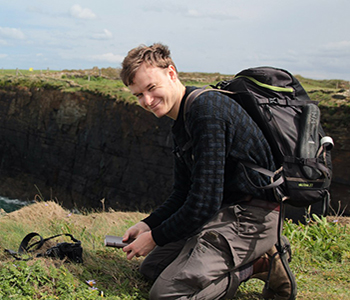Earlier in the year, the University of Stirling Students’ Union passed a motion for the Careers Service to divest from fossil fuels. Here’s why and what happened next.
For some years, protests across UK campuses have targeted career fairs and fossil fuel recruiters with sit-ins and blockades. The protests have challenged universities to review the companies that they are inviting to attend careers fairs or advertise their vacancies on careers websites.
Earlier in 2024, the University of Stirling Students’ Union passed a motion submitted by the Global Justice Stirling student group to request for the Careers Service to divest from fossil fuels.
Gabi Brame, Sustainability Development Coordinator at the Students’ Union was involved in the project. “The motion was inspired by the People and Planet Fossil Free Careers campaign and we wanted to do something similar at Stirling.” The campaign has called on university careers services to end recruitment pipelines into the oil, gas, and mining industries. “We wanted to make sure that the Careers Services only work with those employers who are truly committed to net zero.”
Lynsey Joyce, Head of Work Based Learning: “it was good timing when the Union approached us because we had joined the Sustainable Recruitment Alliance earlier in the year.”
The WBL and Careers services in Student Skills and Employability had recently signed the Sustainable Recruitment Alliance Pledge. Members pledge to put sustainability at the heart of their operations and to reduce carbon emissions. Stirling was the first university in Scotland to do so.
“When the Union contacted us,” Lynsey said, “we were keen to respond and work with the students on this. We had already been thinking about these key issues in careers in terms of the employers that we work with for our events and activities.”
It wasn’t straightforward. Gabi quickly realised “there would be tricky issues to sort through to agree a policy that satisfied everyone. But there was a good dialogue right from the start.”
One of the issues was impartiality. As members of the Association of Graduate Careers Advisory Services, the Careers Service is bound by the code of ethics. The code states that impartiality is core in careers guidance and when giving advice.
On top that, Lynsey adds, “we had to be careful about unintended consequences. We felt that we couldn’t make decisions on behalf of students and we can’t take away their choices.”
The contentious issues needed careful handling by Stirling’s students and staff. Universities have attracted criticism for not having a policy – or having one.
Backlash to banning of fossil fuel recruiters from UK universities
In 2022 Birkbeck, University of London decided that it would no longer invite fossil fuel companies to their career fairs. There were strong opinions on both sides of the debate.Those with stake in oil and engineering courses – the petroleum geoscience professors, exploration scientists and fossil fuel energy strategists, raised important points.
They explained that graduates should seize the opportunities to be part of the solutions being developed by fossil fuel companies. Only fossil fuel companies have the skills, and the deep pockets, to develop solutions such as carbon capture and storage (CSS). Nor could universities deny students the opportunity to make up their own minds about the career they wish to develop.
Students, activists and other experts have offered a different take on this. They argue that Big Oil and its dependents are not able to solve the climate crisis. They point out that many scientists feel that CCS is unproven, limited and expensive and that these companies are not making enough of an effort to address harm that has been done.
In May 2023, António Guterres, the secretary-general of the United Nations, urged an assembly of graduates to not “work for climate wreckers”. In the same year, UK students pledged a career boycott of insurers if they continued to cover fossil fuel expansion. Evidence suggests that fossil fuel companies increasingly find it difficult to recruit young talent.
Publishing our ethical careers policy
Staff and students at the University of Stirling worked their way carefully to develop a policy that has reached consensus. There is flexibility for independent advice and choice for students, but with an emphasis on actively championing organisations that promote sustainability.
The key conclusion was that “organisations from the fossil fuel, mining, arms or tobacco industries will not be permitted to attend our careers or employer-led events on campus”.
What happens next?
Both careers and the students agree this was a positive process. Gabi felt that “this was a really good first step. We all care about this. But can we develop it further? Maybe we could also be extending this to companies with poor human rights records?”
Lynsey agrees about the positivity of the process. “We are really proud of the collaborative approach we adopted at Stirling. It was great to work with the students. In the end we all want the same thing and solve the climate crisis, especially for our students. They face a difficult future if we don’t all do as much as we can now.”
Students and staff will review the policy next year and see how it could evolve. The WBL team are also planning an event next spring around promoting and educating students on future nature-positive jobs.
“The work continues,” as Lynsey puts it.
Find out more
Find out more about sustainable careers and read our ethical careers policy.
Students and staff are working to make Stirling a sustainable university and tackle the climate and ecological crisis. Find out what we do and how you can get involved.



